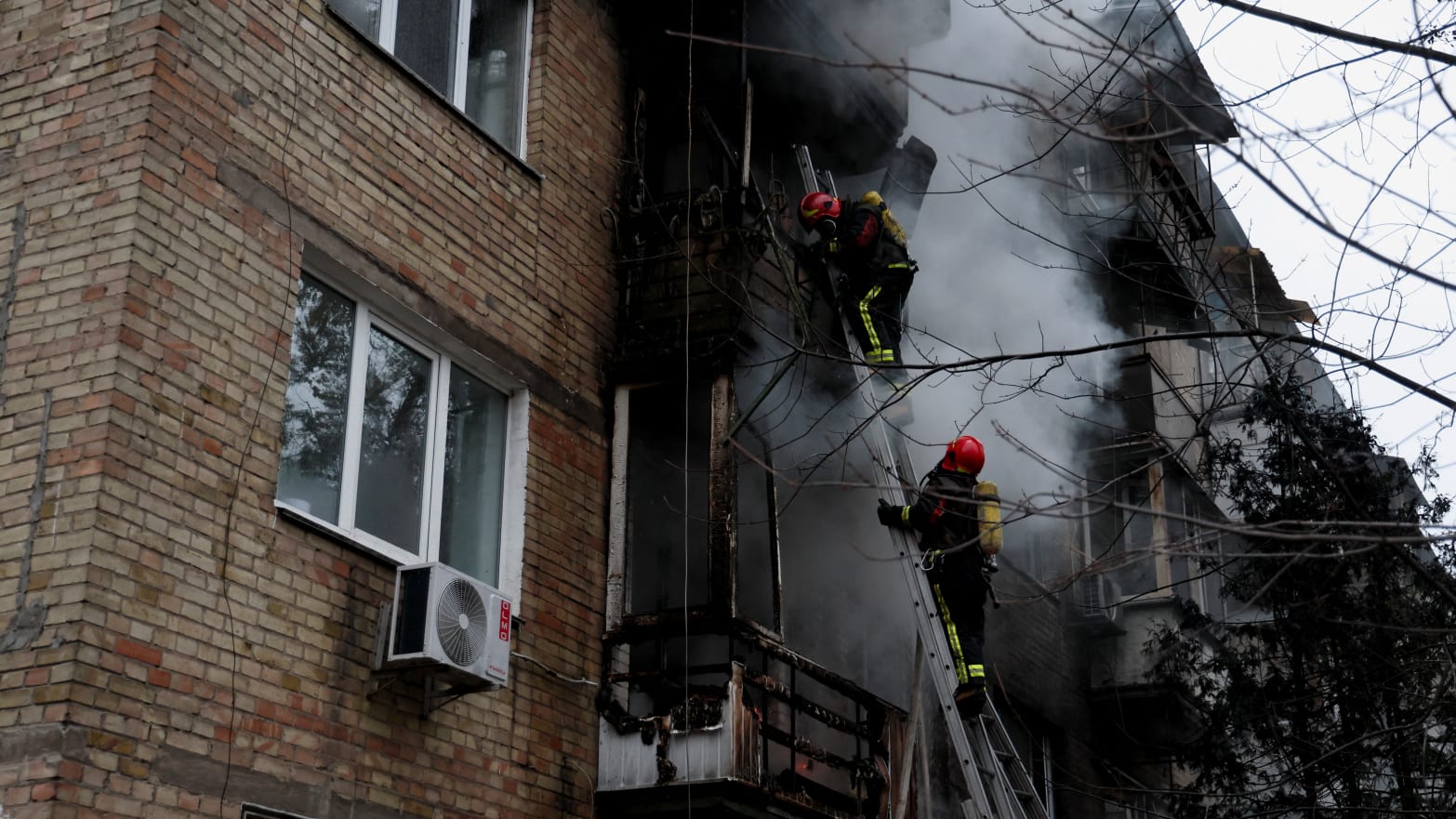In one of the largest attacks on Ukraine since the invasion began this year, Russia unleashed a barrage of approximately 100 missiles on Kyiv and other cities in Ukraine Tuesday, hitting residential buildings and leaving half of Kyiv residents without electricity, authorities said.
Russia unleashed the barrage of missiles just hours after Ukrainian President Volodymyr Zelensky publicly lambasted Moscow at the G20 summit, referring to the group of member states as the “G19” in a slight to the Kremlin.
The Ukrainian president virtually presented a ten-point peace plan to the summit, which included conditions that Russia withdraw its troops and Ukraine restore its territory. The proposal that Russia call it quits coincides with a crushing battlefield defeat for Moscow in the key city of Kherson.
And although Ukraine worked to block some of Russia’s attack with air defenses, top Ukrainian officials said they interpret the attack as a sign that Russia is not interested in taking Zelensky up on the offer and that negotiation is not on the table for now.
“Russia responds to [Zelensky’s] powerful speech at #G20 with a new missile attack,” Andriy Yermak, the head of Zelensky’s office, said. “Does anyone seriously think that the Kremlin really wants peace?”
The missile attacks are a sign Russia does not have true, good-faith negotiations on the radar, Volodymyr Ariev, a Ukrainian lawmaker that is working to secure continued American aid to Ukraine, told The Daily Beast Tuesday over the phone between missile strikes.
“We cannot trust” Russia to negotiate, Ariev said.
“Negotiations, even during the time of war is, normal. But negotiations are successful if… all sides of the negotiations can hold their word and promises, and be responsible to fulfill commitments. Russia is completely not about it,” Ariev told The Daily Beast. “We see no sense in the negotiations.”
The questions about whether Moscow is prepared to negotiate over the war in Ukraine, which is now in its ninth month, come as American officials appear to be testing the waters on potential negotiations. Just days ago the Chairman of the Joint Chiefs of Staff, Gen. Mark Milley, indicated that the wintertime may provide a “window of opportunity for negotiation” with Russia. U.S. officials have reportedly requested that the Zelensky administration signal an openness to negotiate with Moscow, according to The Washington Post.
As Russian routs on the battlefield stack up, state-owned media in Russia have been amplifying narratives that western leaders are interested in negotiations as well.
But the attacks Tuesday appear to have solidified Ukrainian resolve that Russia is not interested in peace, and that victory against Russia will have to come from the battlefield.
“This is what Russia has to say on the issue of peace talks. Stop proposing Ukraine to accept Russian ultimatums,” Foreign Minister Dmytro Kuleba said. “This terror can only be stopped with the strength of our weapons & principles.”
Although some officials drew a connection between the proposal and the missile attack, a Ukrainian Air Force Command representative, Yuriy Ignat, warned earlier this week that Russia might use the timing of the G20 summit to attack Ukraine.
From a diplomatic perspective, Ukraine would do well to focus on relationships and pacts with other countries to counter Russia, rather than looking solely to Moscow for a path forward, according to Ariev.
“The only guarantee for Ukraine now… the best peace guarantee for Ukraine… is joining in on NATO,” Ariev said.
The missile strikes could be a harbinger of more attacks to come. Russian forces have stepped up their attacks on Ukrainian infrastructure as Ukrainian counteroffensives have forced Russia to flee. Already, Russian attacks have damaged Ukraine’s electricity grid and Ukrainian authorities have been conducting rolling blackouts.
“We don't have a fatigue of the war,” Ariev said, but there are “very difficult months ahead” given the impending winter. While on the phone with The Daily Beast, Ariev mentioned that he was in a blackout.
Ukraine is working to establish 1,000 heating shelters, which can double as bunkers, to help in the winter months ahead, according to The New York Times. Some Ukrainians are planning evacuation if the situation grows worse, CNN reported.
“This winter we have to be much more united now to succeed in contradiction to Russian invasion,” Ariev told The Daily Beast.
The attacks Tuesday impacted energy generation and transfer, German Galushchenko, the Minister of Energy of Ukraine, said, according to the Interior Ministry. The mayors of Lviv, Rivne, and Kharkiv reported some power outages as well.
Zelensky addressed Ukrainians Tuesday in an attempt to reassure civilians in the wake of the attacks.
“We're working, we'll restore everything, we'll live through everything,” he said.

